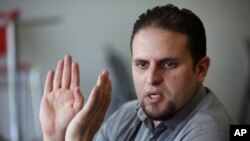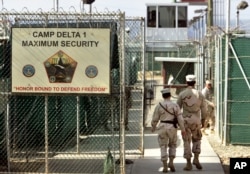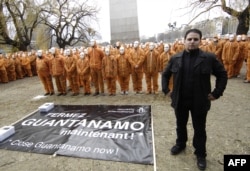In early 2002, Mourad Benchellali found himself locked in a cage at the U.S. military camp at Guantanamo Bay, responding to taunts and blows from his interrogators, as prisoner “161.”
“I live in a world where there are 'them and us,' and I am with the Muslim dogs, the 'worst of the worst,'" Benchellali later writes in his book Journey to Hell, recounting his experience at the now-closed Camp X-Ray, used as the first detention facility at Guantanamo for suspected militants captured after the September 11, 2001 attacks on the United States.
More than a decade later, a Paris appeals court has ordered the then-Guantanamo prison chief to appear as an “assisted witness” Tuesday (March 1), over allegations of illegal detention and torture involving Benchellali and another ex-detainee, Nizar Sassi.
“We think he should have been charged, but it’s a step at least to have him as assisted witness,” said Benchellali’s lawyer, William Bourdon, of retired U.S. general Geoffrey Miller, who ran Guantanamo between 2002 and 2004.
Miller’s summons as an "assisted witness," refers to a French legal term that carries more weight than a simple witness, but does not imply formal charges.
Both Bourdon and Benchellali doubt the retired general will show up Tuesday, much less ever face trial in France, but say the court order is a first victory.
“It’s not just symbolic,” Benchellali said. “We may be able to enlarge the area of responsibility and summon other people. We hope the judges will be able to continue their investigations.”
The scheduled hearing comes a week after U.S. President Barack Obama urged lawmakers to approve a White House plan to close Guantanamo and make good on a promise he made as a candidate in 2008.
For Benchellali, it helps advance a personal mission to clear his name, after spending two-and-a-half years at Guantanamo as an alleged "enemy combatant."
Written after his release, the book traces Benchellali’s journey from a gritty suburb of Lyon to Afghanistan, where his brother had promised him and Nizar Sassi a “holiday.” Instead, the two found themselves in an al-Qaida training camp.
The book describes how the two eventually escaped, crossing into neighboring Pakistan. It was late 2001, and the United States was still reeling from the September 11 attacks. The pair were soon captured and turned over to American forces, who transferred them to Guantanamo.
“I cannot describe in just a few lines the suffering and the torture; but the worst aspect of being at the camp was the despair, the feeling that whatever you say, it will never make a difference,” Benchellali wrote of his experience in a 2006 op-ed article for The New York Times.
In 2004, he was transferred to France, where he spent two more years in prison before his release in 2006. A year later, a French appeals court overturned terrorist conspiracy convictions against Benchellali and four other former Guantanamo inmates.
Both Benchellali and Sassi have been demanding for years that French courts launch legal proceedings against Miller. Last April, the Paris Court of Appeal demanded he appear for questioning.
In the United States, Miller has also been summoned for questioning over prisoner abuse at Guantanamo, as well as the abuse of detainees at Abu Ghraib in Iraq, where he helped to establish the prison’s interrogation system.
The U.S. Defense Department did not immediately comment on the French court summons.
Today, Benchellali criss-crosses France and other parts of Europe to tell his story and warn youngsters against radicalization. With hundreds of Europeans believed to be fighting in Iraq and Syria, he is in demand, although, he says, some French schools are still reluctant to invite him to speak.
In November, he was blocked from entering Canada, where he says he had been invited to participate in several events. After detaining him for two days, Toronto border authorities sent him back to France.
Benchellali, however, is undeterred. He toured Brittany recently with Amnesty International, and will be speaking this week to youngsters in Belgium. He also wants to return to Canada, where he says, “there are things to do for youngsters there.”
He will be tracking the Paris proceedings closely. He has received messages of support from other ex-Guantanamo detainees.
As for Miller, Benchellali still holds out hope for answers.
“I want him to explain why he gave orders to torture us,” Benchellali said, "and how he can justify them.”






